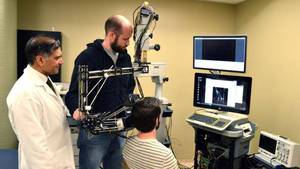Cancer touches everyone in some form or another, but life after cancer, with tolls both physical and emotional, can be a challenge all its own.
Dr. Robin Urquhart is a research scientist in the QEII’s Department of Surgery, her focus to inform and enhance quality of care. In the course of routine studies, she’s come to appreciate myriad difficulties faced by cancer survivors during their transition back to “normal” life, be they overwhelmed by fear of recurrence, a sudden lack of activity, unexpected side-effects or the simple absence of information concerning their health.
“This grant is to decide what’s important to survivors and other stakeholders so these needs can be met.”
Dr. Robin Urquhart
“Much of the literature will show you that anxiety levels and fear are actually higher after cancer treatments than during,” says Dr. Urquhart.
In order to better understand these post-treatment hurdles, Dr. Urquhart began organizing four Canada-wide studies made possible by a $950,000 grant from the Canadian Institutes of Health Research. Over the next five years, she and colleagues will identify what matters most to cancer survivors during their transition, so that a healthcare “intervention” might be developed for a select few provinces, Nova Scotia among them.
“This grant is to decide what’s important to survivors and other stakeholders so these needs can be met,” she says.
Her work thus far suggests access to information will be high on that list, an intervention as effective as it is straightforward. Dr. Urquhart explains that after the constant activity and attention of cancer treatment is over, patients may feel forgotten, left with too much time to think and uncertainty as to what’s expected of them. A kit outlining their follow-up screenings for the next five years, the tests they should and should not consider, tips for healthy living, numbers to call with questions, community resources at their disposal and a simple summary of their medical situation, could do people a world of good. This kit is only one possible intervention her studies may suggest.
Marianne Arab is the provincial manager of psychosocial oncology, palliative and spiritual care, and by way of example, one of her most successful initiatives to date is the Survivorship Care Plan, a booklet providing some of this information to survivors of certain cancers.
“It’s the one thing nurses constantly call asking for more of,” she says.
Dr. Urquhart’s version will cover more ground of course, and be broadly applicable, as different survivors prioritize different sets of information. It will also be adaptable to the differing cultures, genders and ages using it.
Helping survivors cope with the fatigue, brain fog, even impotence, which can result from the treatment of certain cancers, in both the near and long terms, are other potential interventions Dr. Urquhart’s studies might suggest. While they’ll only be implemented in a few provinces to start, her work could serve as a template for others interested in following suit.
Cancer survivors make up a full three per cent of the Canadian population — over one million people. The results of Dr. Urquhart’s study series might not ease the consequences of their ordeal, but they could serve to improve quality of life and offer peace of mind.








